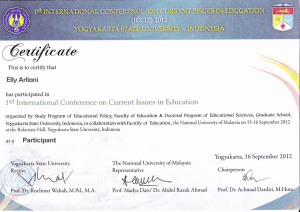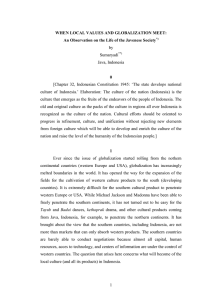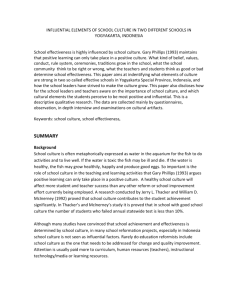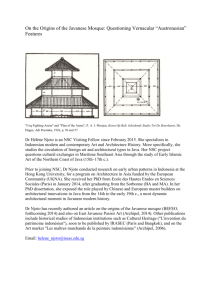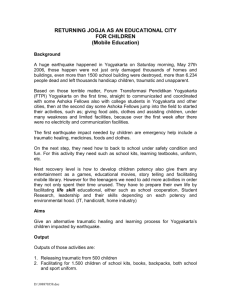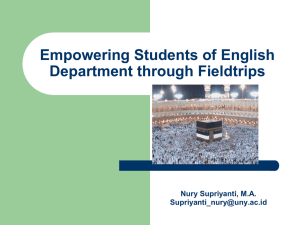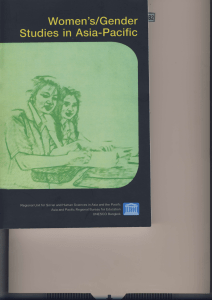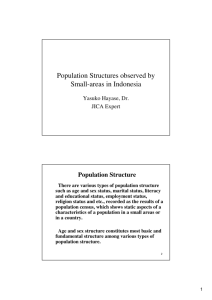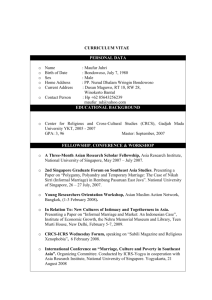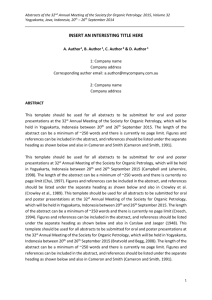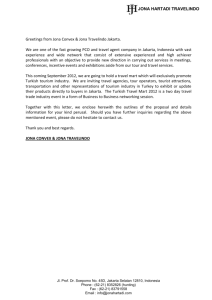betawi - Courseware
advertisement
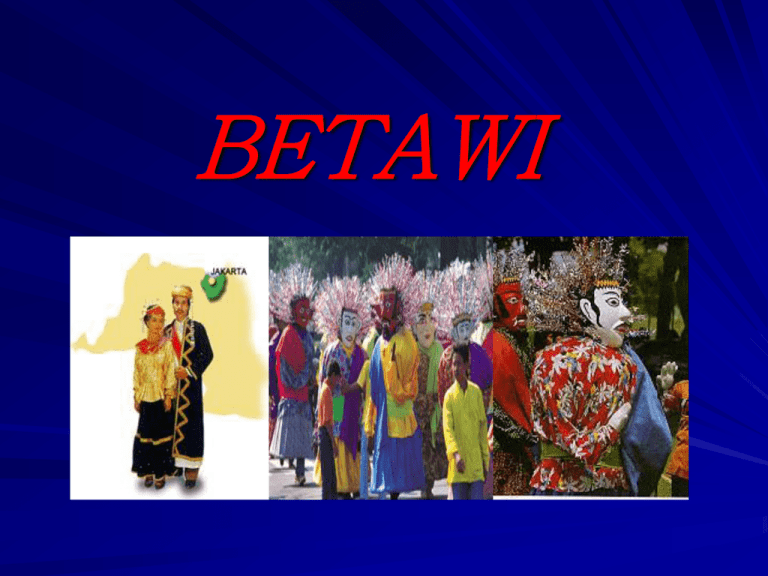
BETAWI Bekasi and Tangerang map The Betawi people are concentra ted more in Bekasi & Tangeran g, Java History One of Jakarta’s major ethnic groups Their culture emerged from the melting pot of races, ethnic groups and cultures of Indonesia in the 19th century Strong Islam and Javanese influences in the Betawi culture of arts and music Betawi has a wonderful culture of its own Culture Music : Gambang Kromong, Rebana Biang Dances: Cokek, Samra, Japin, Blenggo Puppet play: Wayang Kulit Betawi, Ondel ondel Ondel ondel Huge male or female puppet, about 2.5m height, made from wooden bamboo Their parades are usually accompanied by gambang koromong music Costume Man's Costume : A thight - length coat with normal trousers, Slip - on shoes Traditional Betawi headgear A special belt, called lokcan A dagger slipped in the belt A watch chain with a tiger claw attached Costume Woman's dress : A long Kebaya with buttened cuffs A sarong with the lasem motif Pointed sandals with low heels A hair - piece of the cepol type A veil matching the kebaya A heavy gold or silver belt A three - teir brooch to fasten the kebaya Yogyakarta Map of Yogyakarta History The earliest recorded history dates back to the 9th century which was dominated by Hindu and buddhist kingdoms. Yogyakarta itself dates back to the 18th century when the Muslim Mataram Kingdom was ruled by Paku Buwono II. After his death, there was a conflict between his son and his brother which was encouraged by the dutch who were trying to colonize the region on a ‘ divide and rule’ basis. Temple of Borobudur Yogyakarta Population: 30,851,144 (2000 census), which makes it the third mostpopulous province in indonesia. Main gateway to the center of Java where it is geographically located. Consists of five regencies and is one of the 26 provinces in Indonesia. Yogya: Distinct, traditional Javanese character. From 1946 to 1949, it was the capital of the Indonesian Replublic but for now it is the capital of the special territory of Yogyakarta Yogyakarta Yogyakarta Royal Troops Most of yogyakarta’s people are muslims. The main language of the city and the territory is Javanese. Agriculture produce in the territory includes corn, peanuts, rice and soybeans and there are many plantations of cacao, coconuts, coffee, cotton, kapok, pepper, rubber, tobacco and vanilla. Harvesting crops farmers raise buffaloes, cows, goats, hogs, horses and poultry as their main source of income. Major Festivals Greberb Syawal Ceremony (December/January) expresses praise and gratefulness to God by Moslems after having completed their fasting duty in the sacred month of Ramadhan. The ceremony begins with the parade of the Kraton guards in their colourful uniforms comprising of the Wirobrojo, Daeng, Ketanggung, Jogokaryo, Prawirotomo, Mantrijero troops lead by their commander-in-chief. Marching from the Siti Hinggil, through the Pagelaran to the Northern Square and then the Gunungan procession soon follows. • Tanggap Warsa Suro (Javanese New Year) (Anytime from March to May) The Javanese calendar was created by Sultan Agung, King of the Mataram Dinasty, during the 16th century in Java. He mixed the Caka calendar with the Arabic calendar, (while the Caka calendar was a mixture between the original Javanese calendar and the Hinduist calendar in the first century). The Javanese New Year celebrations are started off with wayang kulit performances on Parangtritis beach close to Yogyakarta itself. Major Festivals Anniversary of Buntul Regency (July) The celebration of Bantul's anniversary is done in the traditional way. Traditional processions are held with its participants clad in traditional Javanese dresses, accompanied by various folk dances. It is held at Trirenggono square, Bantul starting early and ending with a procession of heirlooms. This procession uses andong (four-wheeled horse cars) escorted by guards in traditional dress. The End Presented by: Pua Weicheng (u037438b) Quek boon Guan Danny (u020094h) Hii Meng Ni (u041909x) Sarah Mei (ht040980l) muahahahahhahaha The Indonesian Island of Bali Geographical Location • One of the 14,000 islands that make up Indonesia • Located 8 to 9 degrees south of the equator, east of Java and west of the Lesser Sunda Islands namely Sumbawa, Flores, Sumba and Timor • Area of 5632 square km and measures up to 140km from east to west and 90km from north to south Geographical Location • Consists of a chain of 6 volcanoes, between 1350m to 3014m, which stretches from west to east, with Gunung Agung being the tallest • Has lush tropical forests, crater lakes, rivers, rice terraces, fertile vegetable and fruit gardens • The most important form of agriculture on the island is the rice crop Climate • Tropical weather with temperature ranging from 20 to 33 degrees celsius all year round • Rainy season from September to February, with the rest of the year being the dry season • Will need sweater in higher regions of the island, for example, in the mountainous regions of Kintamani Population & Economy • Over 3 million, with 93.18% being Hindus • Most people live in the coastal areas in the south • Economy fuelled mainly by the Tourist industry and supported by agricultural production and trade revenues, namely, from the textile industry and small scale industries producing handicrafts and souvenirs Women in Traditional Costumes during a ceremony in Bali Balinese in Traditional Dresses in Ceremonies th 26 • • Bali Arts Festival The Bali Arts Festival is a full month of daily performances, handicraft exhibitions and other related cultural and commercial activities during which literally the whole of Bali comes to the city to present its offerings of dance, music and beauty. On display are trances from remote mountain slopes, forgotten or recently revived village dances, food and offering contests, classical palace dances, stars of Balinese stage, odd musical performances, "kreasi baru" (new creations) from the dance schools of Denpasar, as well as contemporary choreography and dance companies from other islands and from abroad. MADURA MAP OF INDONESIA MADURA ISLAND BACKGROUND INFO Long, narrow island near northeast coast of Java Pamekasan, the capital area of approximately 4,250 km², 66 outlying islands MADURA ISLAND Beaches Beautiful beaches, clear blue waters Slopeng beach and Lombang beach near Sumenep city Slopeng Beach Lombang Beach People Language: Madurese population of about 2.3 million Predominantly Muslim Livelihood farming, fishing, and cattle-raising Local products: ikan, garam CULTURE annual bull racing (kerapan sapi) Bull Racing Bulls of Madurese stock Do You Know? Special fodder for bulls! Leaves of corn, soybean and good grass traditional spices like ginger, pepper, chilli, honey, beer and tens even hundreds of eggs believed to warm and strengthen the bulls The mixture is forced into the mouths of the bulls using a bamboo lath. Bulls in Action Rider on a bamboo sled pulled by a pair of colorfully decorated bulls DONE BY: Priscilla Fan Weiping Lim Yong Hao Terima Kasih South Sulawesi Baju Bodo • The traditional transparent Bugis blouse, the baju bodo or ' short-sleeved blouse', is now used especially for weddings • accompanied by ornate gold jewellery • it's colour indicate the wearer's status - unmarried girls wearing light reds, while older women wore darker colours Map of Indonesia South Sulawesi • previously known as Celebes • an orchid shape island • total land area 227.000 square kilometers • population of 7 million • very beautiful seashore and highlands sceneries • consist of 4 ethnic groups - Bugis, Makassar, Mandar, Toraja Famous attraction • Sengkang -- Centre of Buginese silk • Polewali-Mamasa – silk sarongs and ratten furniture • Ujung Pandang -- its fresh and delicious seafoods, especially the Bugis style ikan bakar or barbequed fish Bulukumba – sandy beaches and traditional ship building • Ujung Pandang • the capital city of South Sulawesi • formerly known as Makassar • the primary port and airline hub of the eastern archipelago • famous for its trade and maritime history Toraja • well known for its specific culture such as funeral ceremony • animistic beliefs • Toraja people grow rice and raise buffalo • traditional houses (“tongkonan”) with roof like a ship with a bow and stern and colourful carvings • echo the horns of a buffalo THANK YOU!!! Done by: Tang Hui Zhi Fang Yixuan Lydia Khoon Chai Wee Tan Manhui Serene Padang, West Sumatra Entering Padang About Padang • Capital of West Sumatra • 500,000 people • Largest port • Minangkabau ethnic group About Minangkabau Air Manis – “Sweet Waters” Padang Houses Provincial Museum
